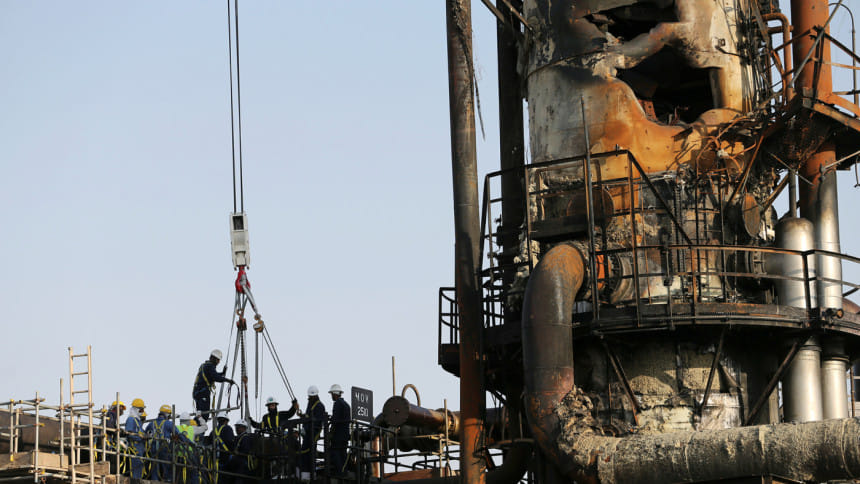Will the US-Iran relations ever normalise?

This change of regime was a shock for Washington, which maintained good relations with Mohammad Reza Pahlavi, the last Shah (King) of Iran, who was exiled during the revolution. Diplomatic relations broke off following the American embassy seizure in Tehran and the hostage crisis in November 1979.
The past forty years has been marked by hostile invective from Washington and a defiant Tehran. Over the years, almost every American president has tried all kinds of pressures to oust the theocratic regime in Tehran. America's Iran policy is largely dictated by its relations with Israel and Saudi Arabia. Both (Sunni) Saudi Arabia and (Shia) Iran vie for the leadership of the Islamic world and are, thus, antagonists.
In its search for security, Tehran continued to make progress in achieving nuclear weapons capability and modernised its defences, despite harsh UN sanctions. It is Iran's nuclear programme that became the sore issue, which the Americans view with alarm. Iran is also accused of maintaining links with militant groups in Lebanon, Syria, Iraq and Yemen. A nuclear-armed Iran would irreversibly change and jeopardise the security architecture that America set up in the Middle East with allies such as Israel and the Gulf states, including Saudi Arabia, the world's biggest source of oil supplies.
With a view to reigning in Iran's nuclear programme, US President Barack Obama spoke for the first time to Iranian President Hassan Rouhani on September 28, 2013. Rouhani was then in New York to attend the UN General Assembly. That historic conversation paved the way for the signing of the nuclear deal known as the Joint Comprehensive Plan of Action (JCPOA) in July 2015, which effectively plugged Iran's nuclear programme. The JCPOA was seen as a convenient mechanism for further improvement of relations between the two countries.
But with the arrival of Donald Trump at the White House in January 2016, fresh sourness from Washington began to flow towards Tehran. Though all the other signatories of JCPOA and the International Atomic Energy Agency (IAEA) were comfortable with the provisions of the treaty, Trump, saying the deal was no good, withdrew from the JCPOA in May 2018, and imposed unilateral sanctions on Iranian oil and banks.
But recent developments in the Persian Gulf and the Strait of Hormuz have caused jitters in the states of the region. Any military conflict in the Persian Gulf region will disrupt the much-needed oil supplies to the world at large, sending the global economy into a tailspin. In May and June, six oil tankers were attacked in the Strait of Hormuz and the Gulf of Oman. Washington immediately blamed Iran for the attacks, which were denied by Tehran. Iran also shot down a US military drone claiming that it was on Iranian airspace. Trump twitted that he called off air strikes on Iran minutes before those were to be launched. However, America deployed a number of warships in the Persian Gulf including an aircraft carrier as a "clear and unmistakable message to Iran" that any attack on the interests of the United States or its allies "will be met with unrelenting force."
But the drone attack on Saudi oil refineries in Abqaiq, on September 14, came as a surprise to the Saudis and Americans. Despite having the most sophisticated air defence systems, the Saudis failed to shoot down the drones. Yemeni Houthi militants claimed responsibility for the attack but Washington blamed Iran for that. Apparently, Houthis got drones from Iran. One wonders whether the Houthis have the technical capability to accurately send drones to Abqaiq. The attack has once again raised tension in the region to new heights. There is still no credible proof that Iran was behind it.
The attack came just days before the Israeli Knesset elections were to be held, on September 17, and in the wake of the G7 Summit in France (August 24-27), where President Macron had announced that France was working towards a meeting between President Hassan Rouhani and President Trump. Trump had said he was willing to meet Rouhani, which was probably to be held in New York during the UN General Assembly 2019. It is difficult to believe the American accusation as it is not in Tehran's interest to scuttle the possible meeting between Trump and Rouhani. Or is it that Tehran is giving a message that it is a power to be reckoned with?
The two options for America after the attack were: either launch military action against Iran or do nothing. Doing nothing would have been seen as weakness. So, Washington decided to send troops to Saudi Arabia to protect Saudi oil facilities and American interests.
Why hasn't the US taken action against Iran? Iranian Foreign Minister Javad Zarif said there would be an "all-out war" if the US takes military action. Indeed, Iran has the capability to wreak havoc on the region if the US attacks Iran. Iran also has missiles capable of hitting Israel. In that case, not only will the Gulf states suffer massively, but oil prices will also skyrocket causing havoc for the global economy. For now, there will possibly be no war, but an accidental conflict cannot be ruled out. So far, despite all the vainglorious threats, Trump has not led America to wars abroad.
After having failed to strike a nuclear deal with Kim Jong-un of North Korea, Trump turned his attention to Iran but with a totally different strategy. With Kim Jong-un, he tried appeasement; with Iran's Ali Khamenei, he is trying "maximum pressure"—as advised by John Bolton, who has recently been sacked.
It is difficult to imagine that, in the foreseeable future, there will be rapprochement between George Bush's "Axis of evil" (Iran) and Khomeini's "great Satan" (America).
Mahmood Hasan is a former ambassador and secretary of Bangladesh government.

 For all latest news, follow The Daily Star's Google News channel.
For all latest news, follow The Daily Star's Google News channel. 



Comments